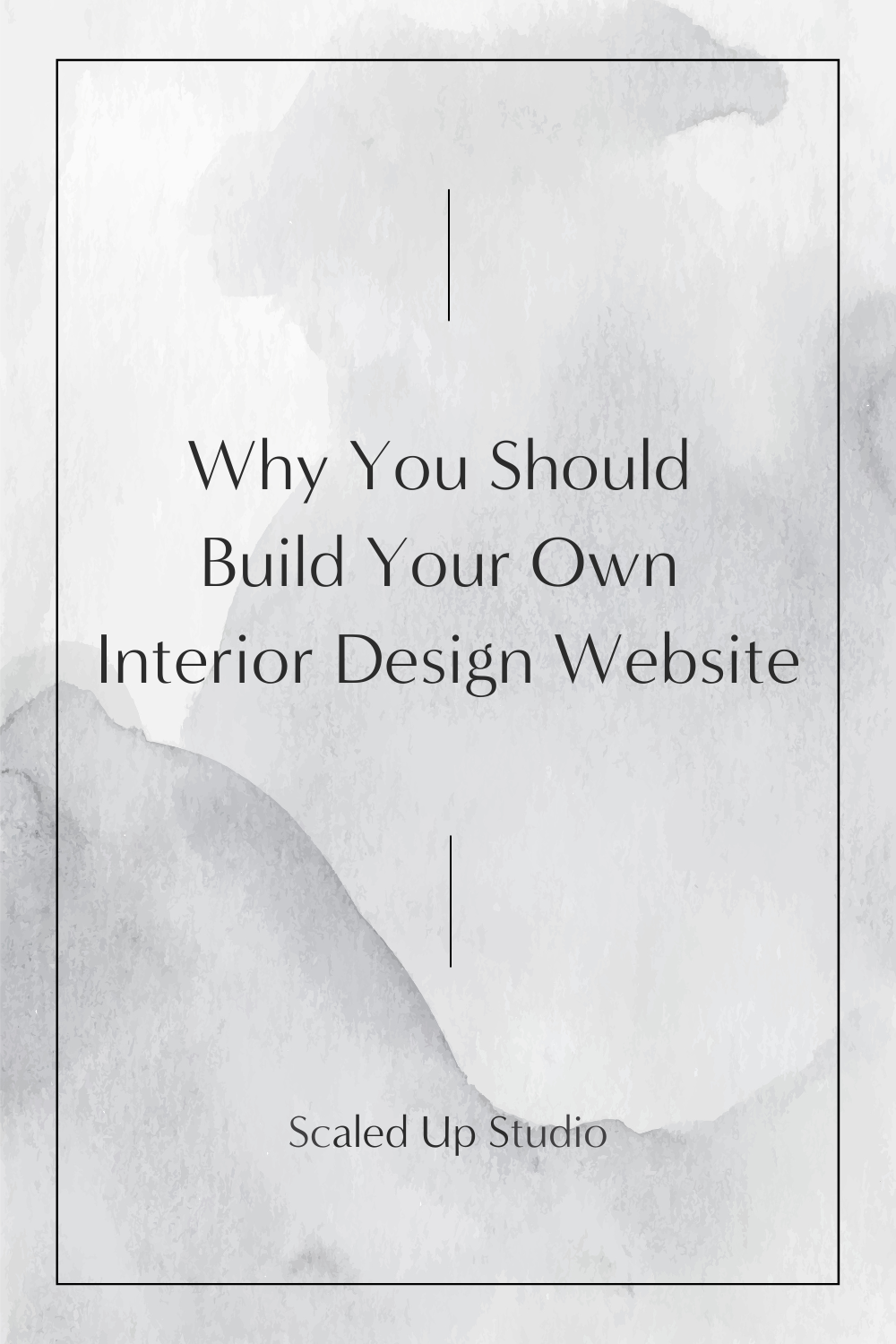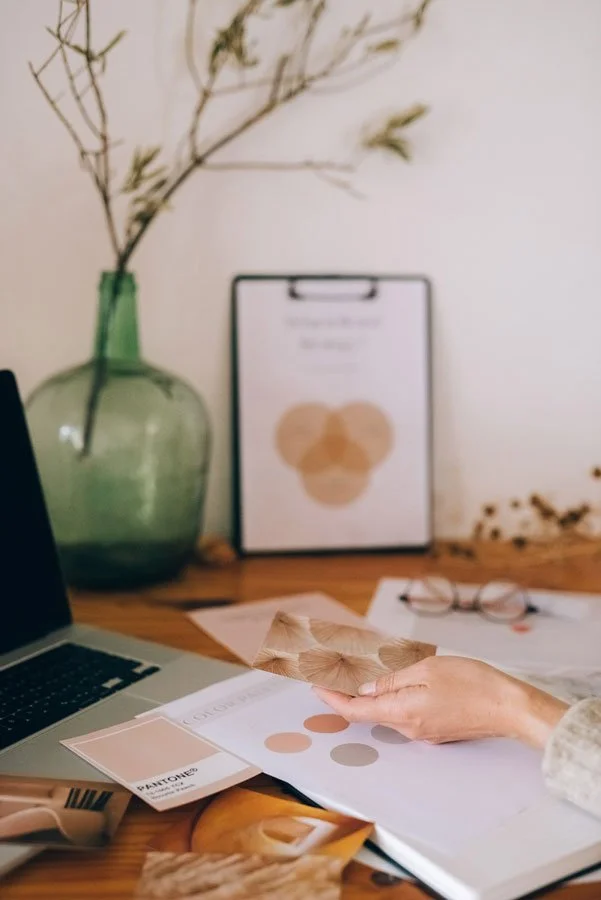3 Great Reasons To Build Your Own Interior Design Website
[This post contains affiliate links. Click here to read my full disclosure.]
Post #2 - DIY Your Interior Design Website Series
How To Start An Interior Design Business
Why You Should Build Your Interior Design Website
Why Squarespace Beats WordPress For Interior Design Websites
Best Interior Design Websites On Squarespace
Best Squarespace Template For Interior Design
Choosing An Interior Design Domain Name
8 Interior Design Website Must-Haves
Interior Design Website Mistakes To Avoid
Why Blogging Is Important for Interior Designers
9 Tips For Writing An Interior Design Blog Post
Are you an interior designer trying to decide between DIYing a new website or hiring a designer? Well you’ve come to the right post!
In case the title wasn’t clear enough, I’m pretty biased toward designers DIYing and managing their own websites. Why? I thought you’d never ask. Allow me to summarize:
Your website is your most important sales and marketing tool.
Your website and your email list are the only online assets you actually own. (social media is rented land my friend)
As a designer, you’re already way better equipped than most to DIY your website. You’ve got this!
This is my ‘thesis statement’, and I’m deadly serious about it. What exactly do I mean by all this? Read on.
Your Website Is Your Most Important Sales & Marketing Tool
Your website is the hub of your brand and business. People who visit your website are much better potential leads than someone who bumps into your social media accounts.
Why is that? If someone finds your website, it was intentional. They have a problem, need, or desire, and they’re actively looking for a solution. So they sat down and googled a search related to their problem, need, or desire, and they landed on your site.
This is much different than when someone encounters your social media post in their feed.
Let’s use “beach vacations in Tahiti” as an example. If someone googles “beach vacations in Tahiti”, there’s a pretty darn good chance they’re at least seriously considering a beach vacation in Tahiti.
By contrast, if someone comes across your travel blog’s Instagram post of a gorgeous beach vacation in Tahiti, they may very well like it and comment “love to be there!” and even follow you, but that’s a far cry from actually planning and purchasing a beach vacation in the middle of the Pacific.
Furthermore, if they find you on social media, in most instances, you still need to get them over to your website to sign up for/buy/book the thing - whatever it is you want them to do.
Therefore, with few exceptions, organic search leading to your website converts much better than social media. Therefore, your website is key.
Your website vs. social media - conversions
Most of us get conversions by funneling our leads and traffic through our websites, even if they originated on a social media platform rather than through organic traffic.
WHAT’S A CONVERSION?
How your platform/website/email marketing campaign “converts” refers to what % of people encountering your platform/website/email marketing campaign etc. are doing what you most want them to do.
In other words, if you expect your Instagram account to drive traffic to your website so people view your services, how much traffic is it sending over? (hint - not much in most cases)
If someone lands on your website and you want them to book a discovery call with you, what % of those visitors are doing so?
There’s no doubt that a large social following is valuable, provided it’s either converting viewers into clients or it’s otherwise properly monetized.
For the record, I have heard of people with 50k Instagram followers needing to come up with $200 to pay bills. So your social media platform, just like any platform including your website, needs to be part of a funnel to turn leads into conversions. Otherwise, it’s essentially a time-consuming hobby.
2. Your website and your email list are the only online assets you actually own.
Developing a large social following is absolutely valuable, however, you’re at the mercy of that platform.
Ironically, today turned out to be a PERFECT example! All Zuckerberg Inc. apps were down for around 6 hours - Facebook, Instagram, WhatsApp etc. If most of your audience is captive on Instagram or Facebook, you were totally out of luck re communicating with them.
If on the other hand, you’ve also built up a good email list via your website, you still have an open line of communication with your audience (even if they normally love to see you show up on Insta :)
“Well Tina, what if your email campaign server goes down?!” Yes that could certainly happen, but unlike social followers, you can download a spreadsheet file of your email list anytime. Try that with Instagram/Facebook. (That’s why you can also switch email campaign marketers.)
In the end, social media’s not a platform you own. Furthermore, [insert-a-social-media-platform-name] wants to keep everyone on said platform for as long as they possibly can. So they aren’t exactly motivated to help you move viewers from their platform to your website.
For example, If you’re a Pinterest user, look at how pins have changed - Pinterest has made it much more cumbersome to click through to a content creator’s site. The entire pin image used to be clickable, now you have to seek out the tiny bottom text to click through.
Algorithm Changes
If Zuckerberg Inc. comes up with an algorithm change that doesn’t work in your favor, you have very little control.
Google algorithm updates can certainly affect your traffic too, but with SEO, you often have forewarning of what might be coming down the pipeline, and if your traffic takes a hit, there are often numerous strategies to help improve it.
Social platforms are naturally looking out for themselves.
3. You need creative control over your most valuable sales and marketing asset - your website
So the differences between social media and organic traffic are the reason why I think designers should build and manage their own sites.
It’s key you’re able to be responsive and agile. A website that sits collecting digital dust isn’t going to cut it, no matter how beautiful it is.
Just think about the years 2020-21. Who amongst us didn’t have to pivot?! So thinking of your website as a “one and done” project isn’t the path to a thriving business.
Being able to easily add new work to your portfolio, create blog posts, and change up your online marketing strategy is key.
On-going experimentation is what’s required to figure out what’s working and what isn’t. You need to have a willingness to try and fail, to get back up and dust yourself off, and try again.
And I would argue that you’re in the strongest position to do this if you know your website inside and out.
You may say, “I don’t need to know this stuff, I have a team.” Yes, as you grow, there will hopefully come a point where you hand over the reins to someone else to handle your web content. However, I’d still argue that you should be able to handle making changes on your own should you need to. Things change, people come and go, and you don’t want to ever find yourself in a bind.
For example, a friend who is a successful business owner asked me to do some updates for her WordPress site last week. Why? Her assistant went off the rails and is no longer with her. The assistant also did web design on the side and would do everything for her site. So now those needed changes are on hold since my friend isn’t comfortable messing with WordPress.
Of course this isn’t specific to websites. I worked for a landscape architect who is no doubt, one of the best in the U.S. in her particular landscape architectural niche. (yes, even landscape architects can niche) However, she doesn’t know how to use AutoCAD.
She has the skillset for everything else in spades, but she is absolutely dependent upon key employees for executing every document and plan set. If anything were to change in that particular setup, it would be very challenging, if not impossible, to keep meeting client deadlines for a serious chunk of time.
I realize you may be thinking “Yeah Tina, big surprise - it’s called doing what you do best and outsourcing the rest.”
However, I would argue that as a designer or any creative small business owner, especially if you’re a small team, it’s crucial to be able to mange your own website.
I wouldn’t make this case for every industry by any means. When I designed a website for a physician, there was no way he was ever gonna take on managing that site. Because of the nature of his specialty, it rarely needs changing, and when he does need to change things up, (think 2020!) it would never be worth his while to DIY it. He doesn’t have anything approaching the skillset for it, learning to do it wouldn’t add value to his core skillset, nor would it be worth his billable hours.
As interior designers though, the situation is different. Designers think differently. Creatively. It’s a unique skillset. It matters little if we have formal web design skills. (How many of us actually have that?)
Think about it. Your creative skills bleed into all sorts of other facets of your life! I bet you have a much more “designed” home/fashion sense/garden/whatever than your accountant and lawyer friends. Am I right?
As designers our situation is different. We think differently. We have a unique skillset. Formal web design skills? Not so important. (How many of us actually have that?)
So while applying those skills toward creating your website may seem daunting at first, trust me, you’ve got this.
Especially with an all-in-one website building platform like Squarespace. Squarespace was created with artist, designers, and creatives in mind. It gets you and it makes showcasing your best work easier and more beautiful than ever.
Well I hope I gave you some food for thought. And speaking of thoughts, what are yours on this subject? Are you a quick “DIY heck yes” or “hire me a web developer quick”?
Leave me a comment below, I’d love to hear from you.
New to Squarespace? You can sign up for a free trial, and I can even get you a discount! Use code GREENHOUSE10 to save 10% off your first year.
Check out these other helpful business-building posts:
Don’t forget to Pin it for later!
If you have any questions or comments, please drop me a note below. Be sure to check back for my response (I always respond) since no notification is sent.





